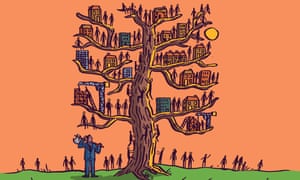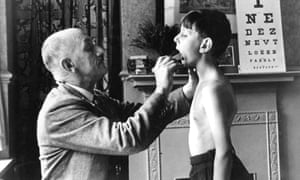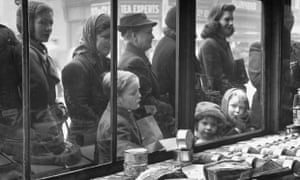What will the landscape look like when we wake from the nightmare? The fantasies, and anxieties, about the future are already with us
Sun 19 Apr 2020

‘The landscape after the plague will be unfamiliar.’
Illustration: Dom McKenzie/The Observer
The French used to be mad about the cure de sommeil – the sleep cure. Dr Jakob Klaesi of Bern invented it. Drugged, you pass out for days or even weeks. Then, cautiously, you are woken up. You are supposed to find you feel quite differently about things.
Politicians insist that lockdown under coronavirus is like the experience of wartime. It’s not – except in one way, which I’ll come to. It’s so quiet, for one thing. War is noisy. Sirens, soldiers tramping past singing, Luftwaffe engines in the night sky.
These lockdown weeks are more like induced sleep. Nine out of 10 of us see and hear nothing of the nurses and doctors, the bus drivers and key workers. We learn of their bravery and their deaths only by radio, from a screen or a newspaper left by a boy in a mask. For most people, life is on hold. A trance descends, soothed by birdsong, a dog barking, an ambulance in the distance.
The French used to be mad about the cure de sommeil – the sleep cure. Dr Jakob Klaesi of Bern invented it. Drugged, you pass out for days or even weeks. Then, cautiously, you are woken up. You are supposed to find you feel quite differently about things.
Politicians insist that lockdown under coronavirus is like the experience of wartime. It’s not – except in one way, which I’ll come to. It’s so quiet, for one thing. War is noisy. Sirens, soldiers tramping past singing, Luftwaffe engines in the night sky.
These lockdown weeks are more like induced sleep. Nine out of 10 of us see and hear nothing of the nurses and doctors, the bus drivers and key workers. We learn of their bravery and their deaths only by radio, from a screen or a newspaper left by a boy in a mask. For most people, life is on hold. A trance descends, soothed by birdsong, a dog barking, an ambulance in the distance.
What happens when it’s over? European literature has a genre of “the landscape after the battle” – the ruins, the hunger and cold, the search for family survivors. The landscape after the plague will be unfamiliar, but not like that.
In the first place, emerging from isolation – waking up – must be handled carefully. It’s the phase de sevrage, weaning the patient from sleep. “This prolonged dive into the world of dream can allow a patient to exercise their fantasies, perhaps to discover the links between them,” warns a French doctor. “Harmful after-effects are possible, provoking in some patients paroxysms of depressive anxiety.”
The fantasies and anxieties are already with us. And here one comparison with wartime does work. The longer the virus emergency lasts, the more the memory of the pre-virus world begins to grow unreal, unconvincing. It was like that in the Second World War. “Peacetime…”
Was there really a Britain, only a few years ago, when you could buy as many sweeties as you wanted? A time when the work of millions of men and women wasn’t wanted, when the poor couldn’t afford a doctor, when middle-class families had servants they could sack when Madam was in a bad temper? It wasn’t just working-class people who began to ask: “Could we really have lived like that? This war’s changed everything. Pity, in some ways, but it couldn’t go on.”
 Was there really a Britain, only a few years ago, when, outside the schools medical service, the poor couldn’t afford a doctor? Photograph: Daily Herald Archive/SSPL via Getty Images
Was there really a Britain, only a few years ago, when, outside the schools medical service, the poor couldn’t afford a doctor? Photograph: Daily Herald Archive/SSPL via Getty ImagesNow, unmistakably, there’s a feeling that “things will never be the same after it’s over” and “we can’t go back to all that”.
Can’t we, just? Some of those who govern us can imagine only restoring “their” Britain, disfigured by inequalities. They will exploit the real and moving solidarity shown in these pandemic months, as they confront the colossal debts left by rescue spending. They will impose another “we’re all in this together” campaign of savage austerity at the expense of social services and the poor.
And yet, just as in 1945, voices are starting to say “never again”. As in: never again “austerity”, which leaves people helpless in an emergency. Never again the emaciation of the welfare state, and the NHS above all. Come to that, never again neoliberalism. But who will do the politics of “never again” when we open our eyes? Or are these hopes just “prolonged dives into the world of dream”, pathetic fantasies dissolving into “paroxysms of depressive anxiety” as Britain wakes from its corona coma?
The landscape will look different. Mass unemployment, as hundreds of firms go bust in spite of government loans, made much worse if the suicidal idiocy of a no-deal Brexit really happens at the end of this year. Concentration of wealth and power in fewer hands, as big companies cannibalise what’s left of smaller enterprises. Bankruptcies devastating those charities and funds that maintained so much welfare and research as public spending withered under austerity.
Photograph: Pat English/Time & Life Pictures/Getty Image
Yet there’s new light, too. Neoliberalism is dead, but Boris Johnson’s own path away from it leads to a UK version of European neopopulism: a powerful nationalist state, insular and xenophobic, harsh on human rights, big spender on the welfare of the “left-behind” masses. Rishi Sunak’s discovery of billions for business rescue, like the cities’ discovery of millions to house their rough sleepers, shows what was always possible. Debt and deficit soar but – turning Tory orthodoxy inside out – they seem not so lethal after all. And a dose of moderate inflation? Why not?
The state is back. A liberating thought for Labour under Keir Starmer. But a strong British state in the 2020s – what will that smell like? The historian David Edgerton, asking himself: “When was Britain?”, answers: not in the high days of empire, not even in 1940, but in the postwar decades after 1945. Then Britain became a strictly centralised and planned state. Almost self-sufficient (“Export or Die!”), it was industrialised as never before or since. Operated by Tories as well as Labour, this “economic nationalism” only broke down in the 1980s, says Edgerton. In came free-market dogma, the shrinking of the state and devolution wrenching open the faultlines of the United Kingdom.
That “strong Britain” left its peoples healthier, safer, better educated and more equal. But there’s no way back to it. The industrial economy is over. Dragging Scotland and Wales back under Whitehall control – forget it! Johnson’s “strong Britain” may amount only to England weakly imitating the repressive populism of Poland or Hungary.
Yet a great emergency, like this shared time of pestilence, leaves people sensing their own power, aware that they can act without waiting for yesterday’s leaders. When we finally wake up from the long sleep cure, there is a chance to make those “never agains” more than a fading dream. A chance – but lasting only for a few months of creative confusion as we all stand up again and look around. “Rise like lions after slumber,” said Shelley. There is plenty to do, but we have to do it fast.
• Neal Ascherson is a journalist and writer
Yet there’s new light, too. Neoliberalism is dead, but Boris Johnson’s own path away from it leads to a UK version of European neopopulism: a powerful nationalist state, insular and xenophobic, harsh on human rights, big spender on the welfare of the “left-behind” masses. Rishi Sunak’s discovery of billions for business rescue, like the cities’ discovery of millions to house their rough sleepers, shows what was always possible. Debt and deficit soar but – turning Tory orthodoxy inside out – they seem not so lethal after all. And a dose of moderate inflation? Why not?
The state is back. A liberating thought for Labour under Keir Starmer. But a strong British state in the 2020s – what will that smell like? The historian David Edgerton, asking himself: “When was Britain?”, answers: not in the high days of empire, not even in 1940, but in the postwar decades after 1945. Then Britain became a strictly centralised and planned state. Almost self-sufficient (“Export or Die!”), it was industrialised as never before or since. Operated by Tories as well as Labour, this “economic nationalism” only broke down in the 1980s, says Edgerton. In came free-market dogma, the shrinking of the state and devolution wrenching open the faultlines of the United Kingdom.
That “strong Britain” left its peoples healthier, safer, better educated and more equal. But there’s no way back to it. The industrial economy is over. Dragging Scotland and Wales back under Whitehall control – forget it! Johnson’s “strong Britain” may amount only to England weakly imitating the repressive populism of Poland or Hungary.
Yet a great emergency, like this shared time of pestilence, leaves people sensing their own power, aware that they can act without waiting for yesterday’s leaders. When we finally wake up from the long sleep cure, there is a chance to make those “never agains” more than a fading dream. A chance – but lasting only for a few months of creative confusion as we all stand up again and look around. “Rise like lions after slumber,” said Shelley. There is plenty to do, but we have to do it fast.
• Neal Ascherson is a journalist and writer

No comments:
Post a Comment